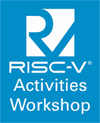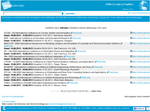Keynote: Design & Verification of Technology Dependent Electronic Innovations
Andreas Aal (Volkswagen, D)
Abstract
The car becomes the ultimate mobile device, a robot being guided by an IoT environment and by integrating step-by-step different levels of artificial intelligence. High performance semiconductor components form the computer, communication, consumer and the power electronics domain as well as assured software infrastructures are required in order to implement the targeted complex functionality. However, corresponding reliability, safety and security levels challenge the automotive industry and force innovative cross layer design techniques involving IC floor planning, careful package design, new PCB design rules and multi-(core), multi-senor and system level redundancy and monitoring concepts. Design and verification for such complex systems cannot longer be established by individual assurance activities of semiconductor vendors, tier ones or car OEMs, but rather through joint specifications and definition of new automotive classifications to be used for technology qualification and release. Also, qualification approaches will very much depend on simulation and virtual testing which requires corresponding extended behavioral models of key semiconductor components. Tools that perform automatic synthesis steps from PCBA to chip level are required including also failure rate related DRC routines. ADAS chip designs of today use predictive technologies in the 7 nm regime, knowing that SER related failure risks are one of the new critical aspects to consider. Also other failure modes will start to gain more importance under automotive loads. Autonomous driving will not be possible (from a cost realization perspective) without innovative design approaches that go far beyond todays state-of-the-art approaches – and that is only a part of the automotive puzzle.
Curriculum Vitae
 Andreas Aal leads the semiconductor strategy and reliability assurance activities within the electric-/electronic development department at Volkswagen, Germany, which he joint 2011. His activities concentrate on technology capability enhancement of nodes down to 12 nm as well as optimization of power electronics for automotive applications. He leads two semiconductor related European projects and is a strong representative of the through-the-supply-chain-joint-development approach.
Andreas Aal leads the semiconductor strategy and reliability assurance activities within the electric-/electronic development department at Volkswagen, Germany, which he joint 2011. His activities concentrate on technology capability enhancement of nodes down to 12 nm as well as optimization of power electronics for automotive applications. He leads two semiconductor related European projects and is a strong representative of the through-the-supply-chain-joint-development approach.
Mr. Aal has been working within the semiconductor industry since 1998 holding different positions from engineering to management working on production monitoring, process and technology development, qualification and failure analysis.











